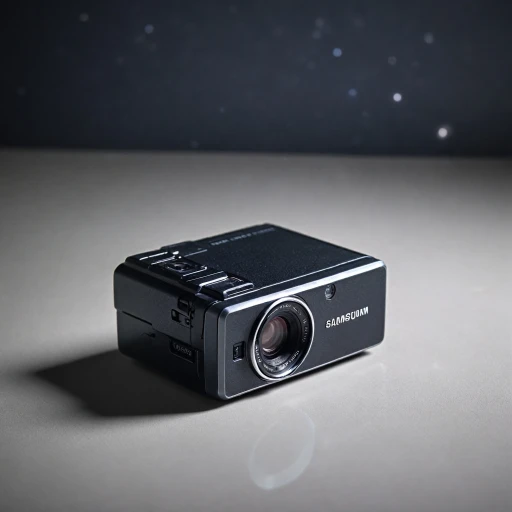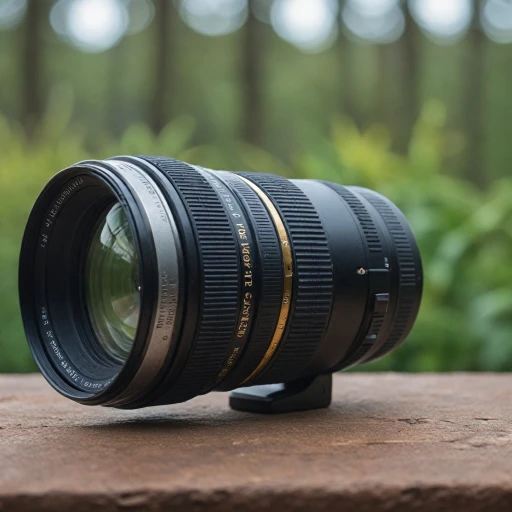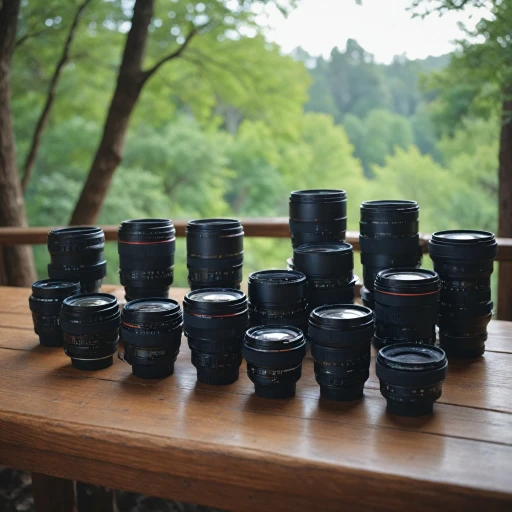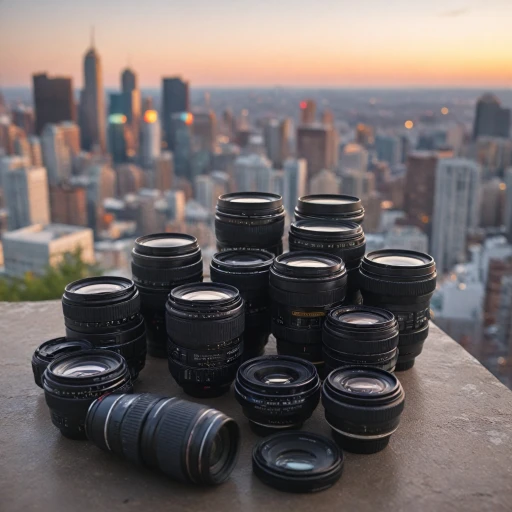
Understanding Wide View Lenses
Discovering the Magic of Wide View Lenses
The fascination with wide view lenses is not new among photography enthusiasts. But what are they exactly, and why do they evoke such excitement? At their core, these lenses allow you to capture images with a broader perspective, pulling more of the scene into the frame. Whether you are shooting vast landscapes or cramped interiors, a wide angle lens can transform the way you capture the world.
These lenses, sometimes referred to as ultra wide or wide zoom lenses, are designed to have a shorter focal length than standard lenses, offering a broader field of view. Different from regular zoom lenses, they excel in scenarios where capturing expansive spaces is essential. The angle lens variations range from wide angle to ultra wide angle lenses, accommodating various shooting needs and camera types.
Wide view lenses come in various aspects, such as fixed or with zoom capabilities. Canon, a key player in the camera market, offers a diverse range of these lenses under their EOS and other product lines. This includes the Canon USM lens and Canon STM lens, both known for their image quality and focus performance. With options to suit full frame DSLRs or more compact cameras, the versatility of Canon's wide angle lenses is undeniable.
Equipped with features like image stabilization and advanced focus mechanisms, these lenses ensure sharp and crystal-clear images even in challenging lighting conditions. Price points can vary significantly across the range, making them accessible for both hobbyists and professionals. When considering purchasing a lens canon offers, understanding the nuances of focal length and image quality becomes vital.
Overall, the magic of wide view lenses lies in their ability to expand your creative horizons, making them an invaluable tool for any photographer aiming to capture more than what meets the eye.
Canon's Range of Wide View Lenses
Delving into the Canon Lineup of Wide View Lenses
The collection of wide view lenses from Canon offers a variety of options designed to cater to diverse shooting needs and budgets. Among these, the Canon USM and STM lenses stand out, each offering different specifications and features.
Canon's wide-angle lens options cover both full-frame and APS-C format cameras, adding versatility for photographers who use different camera bodies. These lenses are equipped with varied focal lengths and zoom capabilities, providing photographers the flexibility of different perspectives, from capturing expansive landscapes to tight interior shots.
The Canon USM (Ultrasonic Motor) lenses are recognized for their speedy autofocus capabilities and lower noise levels, making them a terrific choice for video creators who need smooth and quiet focus transitions. On the other hand, Canon STM (Stepping Motor) lenses excel in providing quiet autofocus operation, thereby enhancing the quality of movie recordings.
Several models within Canon's range incorporate advanced image stabilization technology, resulting in sharper images even in lower light conditions, shaking hands, or when using a zoom lens. Additionally, Canon's ultra-wide options are perfect for photographers seeking an extension beyond the standard wide angle, delivering immersive visuals with minimal distortion.
To truly understand the offerings of Canon's wide view lenses and their suitability across various shooting needs, exploring the technical specifications and user feedback can provide valuable insights. By doing so, photographers can align their lens choice with their specific photographic style and requirements. For those seeking more power in their lenses, the Canon lineup offers worthy contenders that redefine image quality.
Advantages of Using Wide View Lenses
The Reason Behind the Choice
The appeal of Canon's wide view lenses is amplified by the numerous advantages these lenses offer to photographers of all skill levels. A wide angle lens, typically defined by its broader field of view, is an essential piece for capturing expansive landscapes, intricate architecture, and dynamic scenes that demand more from the frame. These lenses allow for the inclusion of more context in every shot, enhancing the narrative without having to rely on tricky post-production edits.
Canon's mastery in crafting exceptional wide angle lenses is evident in the attention to detail and design that goes into each product. The image quality is unparalleled, with Canon's renowned image stabilization technology providing clarity and sharpness even in challenging lighting conditions. Canon's lineup includes ultra wide variations, enabling photographers to push creative boundaries by experimenting with diverse perspectives and focal lengths. These lenses dslr are tailored to support both full frame and crop sensor cameras, widening the range of applicable camera bodies.
Unlocking Creative Potential
One of the most notable advantages of utilizing wide view lenses lies in their ability to create a sense of depth and dimension. By exaggerating the relationship between the foreground and background elements, wide angle lenses infuse images with drama and storytelling potential. This feature is particularly beneficial for landscape and architectural photography, where representing the grandeur and scale can be challenging with standard lenses.
Moreover, the inclusion of advanced focus technologies, such as Canon's USM (Ultrasonic Motor) and STM (Stepping Motor), ensures that wide view lenses deliver fast and silent focusing, making them ideal for both still photography and video applications. These technologies cater to the needs of varying shooting styles, allowing for spontaneous captures with precise accuracy.
Weighing Options
While the advantages of Canon's wide view lenses are clear, making a decision involves considering several factors such as the price, expected use, and specific features like zoom capabilities and angles. With options ranging across the spectrum— from affordable entry-level products to professional-grade lenses — there's ample room to find a lens that aligns with your creative goals. When you're ready to make a purchase, considering factors like shipping costs and availability will ensure a smooth acquisition process.
The competition in this lens category is fierce; thus, each Canon lens remains meticulously designed to stand the test against competing brands. When comparing specifics like image stabilization and focal length, Canon's offerings consistently provide excellent performance and image quality, reinforcing their position as a leading choice for photographers worldwide.
Finally, don't underestimate the versatility of pairing your Canon wide angles with the right gear, ensuring comfort and convenience as you capture the world through a truly expansive lens.
Choosing the Right Wide View Lens for Your Needs
Identifying Your Wide View Lens Needs
Choosing the right wide view lens for your camera involves understanding the specific requirements of your photography projects. Whether you're seeking an ultra wide angle lens or a zoom lens, Canon offers a comprehensive range of products to match your vision.
First, determine the focal length you need. If you're often shooting landscapes, a full frame lens from Canon's range may be beneficial due to its ability to capture broader vistas. For photographers who prefer versatility, a zoom lens such as those with the Canon STM or USM technologies can provide flexibility in varying conditions.
Image stabilization is another critical feature to keep in mind. This is especially true if you're capturing images in environments where movement is a factor, helping ensure your image quality remains top-notch. Canon's innovation in this area helps stabilize your shots, maintaining clarity.
Additionally, consider the price range you're comfortable with. High-end products with advanced features like ultra wide focal lengths or advanced zoom technologies might seem like a major investment, but they often promise better performance and longevity.
Finally, it's wise to compare the options available not just within Canon's selection of wide angle lenses but also what competitors offer. Ensuring the lens fits well with your lenses DSLR or Canon EOS camera will enhance your photography experience, leading to more stunning results.
Tips for Shooting with Wide View Lenses
Mastering the Art of Wide View Photography
Shooting with wide view lenses can be an exciting yet challenging endeavor. To make the most out of your Canon wide and ultra-wide lenses, here are some practical tips that will enhance your photography experience:- Watch Your Edges: Wide-angle lenses capture expansive scenes, but they also have a tendency to distort straight lines. Be mindful of the frame's edges to ensure subjects aren't stretched or skewed, especially in architectural photography.
- Take Advantage of Image Stabilization: Canon's image stabilization feature is a game-changer for reducing camera shake. This is particularly useful when shooting handheld in low light conditions, allowing for sharper images.
- Focus on the Foreground: With a wide depth of field, wide view lenses are perfect for emphasizing foreground elements. Bring attention to the details in the foreground to add depth and interest to your image.
- Experiment with Angles: Don't be afraid to experiment with various angles and perspectives. Getting low to the ground or shooting from a higher vantage point can provide a unique perspective and highlight the lens's capability to capture vast scenes.
- Take Landscape Shots at Narrow Apertures: Utilizing a smaller aperture, such as f/11 or f/16, can enhance overall image sharpness for landscape photography, ensuring both near and far elements are in focus.
- Consider Using Filters: When dealing with bright scenes, consider using polarizing filters to manage reflections and enhance colors. Neutral density filters can also be handy for long exposure shots.
Comparing Canon's Wide View Lenses with Competitors
Comparing Canon's Wide View Lenses with Other Brands
When it comes to choosing a wide view lens, Canon offers a diverse range of options, but how do these stack up against competitors? Let's delve into some comparisons to help you make an informed decision.
Image Quality and Focal Length
Canon's wide angle lenses are renowned for their exceptional image quality, providing sharpness and clarity across the frame. The focal length options available in Canon's lineup cater to both full frame and crop sensor cameras, ensuring versatility for various photography needs. Competitors like Nikon and Sony also offer high-quality lenses, but Canon's consistent performance in image stabilization and focus speed with their USM and STM technologies often give them an edge.
Price and Value
Price is a significant factor when comparing lenses. Canon's wide zoom lenses are competitively priced, offering great value for the features they provide. While some competitors might offer lower-priced alternatives, Canon's reputation for durability and the quality of their glass often justifies the investment. Moreover, the availability of refurbished or second-hand Canon lenses can be a cost-effective way to access high-end products.
Range and Versatility
Canon's range of wide angle and ultra wide angle lenses is extensive, catering to both professional photographers and hobbyists. The variety in zoom lenses and fixed focal lengths ensures that there's a lens for every shooting style. While brands like Sigma and Tamron offer competitive products, Canon's integration with their EOS camera systems and the seamless performance of their USM lens technology often make them a preferred choice.
Shipping and Availability
Canon's global presence ensures that their lenses are widely available, with efficient shipping options for most regions. This availability is a significant advantage over some niche brands that may have limited distribution channels. The ease of finding Canon lenses, whether new or used, adds to their appeal.
In summary, while other brands offer compelling alternatives, Canon's wide view lenses stand out for their image quality, range, and value. Whether you're a professional seeking the best in image stabilization and focus technology or a beginner looking for a reliable lens, Canon's offerings are worth considering.













